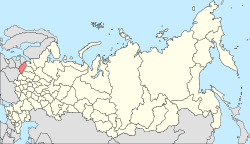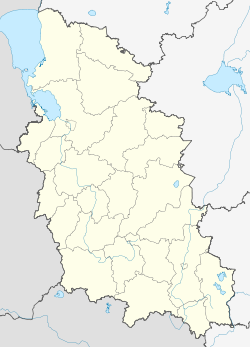Strugi Krasnye
| Strugi Krasnye (in English) Струги Красные (Russian) |
|
|---|---|
| - Urban-type settlement - Work settlement |
|
 Location of Pskov Oblast in Russia |
|
|
|
|
|
|
|
| Administrative status (as of November 2009) | |
| Country | Russia |
| Federal subject | Pskov Oblast |
| Administrative district | Strugo-Krasnensky District |
| Administrative center of | Strugo-Krasnensky District, Strugi Krasnye Urban Settlement |
| Municipal status (as of November 2009) | |
| Municipal district | Strugo-Krasnensky Municipal District |
| Urban settlement | Strugi Krasnye Urban Settlement |
| Administrative center of | Strugo-Krasnensky Municipal District, Strugi Krasnye Urban Settlement |
| Statistics | |
| Population (2010 Census) | 8,447 inhabitants |
| Time zone | MSK (UTC+03:00) |
| Founded | Mid-19th century |
| Urban-type settlement status since | December 7, 1958 |
| Postal code(s) | 181110 |
Strugi Krasnye (Russian: Стру́ги Кра́сные) is an urban locality (a work settlement) and the administrative center of Strugo-Krasnensky District of Pskov Oblast, Russia, located 87 kilometers (54 mi) northeast of Pskov. Municipally, it is incorporated as Strugi Krasnye Urban Settlement, the only urban settlement in the district. Population: 8,447 (2010 Census);8,762 (2002 Census);7,067 (1989 Census).
Named after a nearby village, the settlement was founded in the mid-19th century as the railway station of Belaya (Бе́лая) during the construction of the railroad. At the time, it belonged to Luzhsky Uyezd of Saint Petersburg Governorate. In 1905, it was renamed Strugi Belye (Стру́ги Бе́лые), after the estate of N. M. Lakhtin. In 1919, Strugi Belye was an arena of important events of the Russian Civil War. Originally, the area east of Lake Peipus was under control of the revolutionary government. On October 4, 1919 the White Army troops of Nikolai Yudenich during an advance caprtured the station of Strugi Belye. On November 6, 1919, it was given its present name by the order of G. A. Tomchuk, a commander of an armored train, after the village was taken from the White Guard Armies, to avoid connotations with White Army (with krasny meaning red in Russian).
...
Wikipedia

